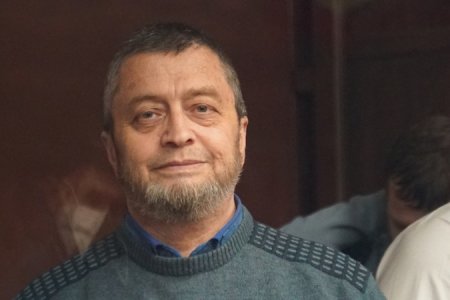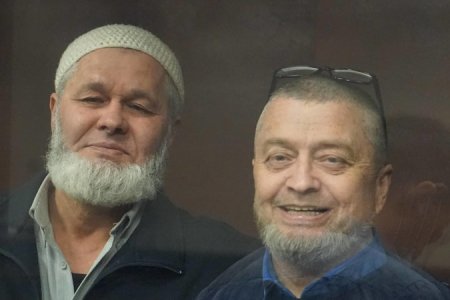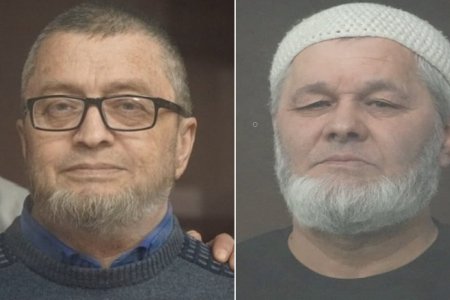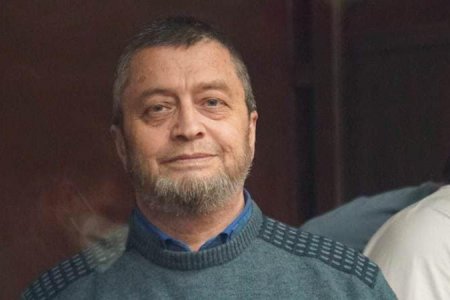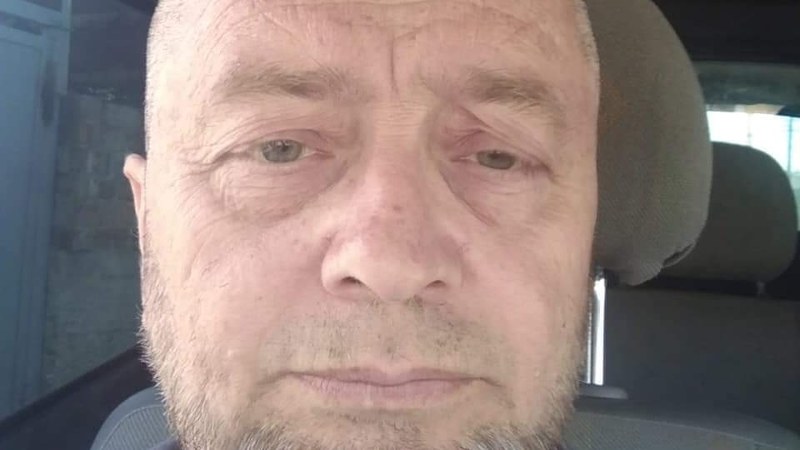
60-year-old Dzhemil Gafarov suffered a heart attack on 27 October in the Russian SIZO [remand prison], where the recognized political prisoner is held despite his life-threatening medical condition. He was unable to get up for the next four days, yet the ambulance team that arrived failed to prescribe any proper treatment or insist that he be hospitalized.
Crimean Solidarity reports that Gafarov spoke of the heart attack during the hearing on 7 November at the Southern District Military Court in Rostov. He explained that his health had sharply deteriorated on 27 October when yet another court hearing was cancelled after he and the other four men had already been brought to court. The heart attack occurred after he was brought back to the SIZO. Yes, an ambulance had been called, he explained, but the doctors had not prescribed anything, and he is seriously weakened and suffering agonizing pain in his joints. It takes him a long time to get over each prolonged court hearing. He therefore asked the court to reduce the number of hearings to one, at most, a week so that his body can cope with all the extra strain of having to walk upstairs, sit for a long time in one position, etc. Gafarov’s fellow defendants confirm that after he is brought to the courtroom, “he sits on the bench green for half an hour”. Gafarov said that if the court would allow him to lie down on the bench, he would do so. Presiding judge Valery Opanasenko at least made no objection to this, although even this may prove problematical since Gafarov is one of two defendants in extremely poor health. 61-year-old Servet Gaziev has already suffered a mini-stroke while in SIZO, and also has enormously difficult enduring the long hearings.
There are serious grounds for fearing that both men will die even before their predetermined sentences on politically motivated charges. In Gafarov’s case, this has effectively been acknowledged by Russian doctors who assigned him indefinite Group Two Disability status. The main criterion for assigning this status is 70-80% failure of vital functions of the organism.
As reported, the doctors’ assessment was given while Gafarov was in a prison hospital in June. At one of the court hearings, Opanasenko actually read out the doctors’ report which listed arteriosclerotic heart disease; post-heart attack cardiosclerosis; angina with chest pressure of classes I and II; chronic kidney insufficiency; chronic inflammation of part of the kidney (chronic interstitial nephritis); third level hypertension; primary arterial hypertension and a very high risk of fourth level cardiovascular complications. Third level hypertension is listed in the Russian government’s Resolution No. 3 on medical conditions which are incompatible with detention, and due to this alone, he should have been released, at least under house arrest.
Opanasenko ignored the diagnosis then, and on 7 November also disregarded the documents provided, in which the hospital medics had issued specific recommendations and a ‘rehabilitation program’. He rejected Gafarov’s application for a likely life-saving reduction in the number of hearings, and said merely that “the issue will be considered each time individually, depending on the defendant’s state of health”.
This means, at a minimum, that a man whose life is in jeopardy, will be put through the gruelling journey, in brutally inadequate conditions, from the SIZO to the court, and very likely forced to walk upstairs. All three judges in this case – Valery Opanasenko; Andrei Zarya; and Stanislav Zhidkov, as well as prosecutor Igor Nadolinsky are fully aware that this is a political case, and that there are no grounds for any of the men to be held in custody, nor put on trial.
Dzhemil Gafarov is a structural engineer by profession. He was diagnosed in 2017 with fourth stage chronic kidney disease, one level before kidney failure, and that same year suffered a serious heart attack. Even before his arrest, his kidney filtration level was between a quarter and a third of what it would be for a person in good health. Such a filtration rate means that he is effectively experiencing a permanent state of blood poisoning.
Back in November 2019, Olga Mazurova, the Russian doctor who initiated a petition calling for Gafarov to be released from custody, warned that Gafarov’s condition was typical of a person in pre-dialysis stage. Connection to a dialysis machine would remove the waste products and excess fluid from his blood, which the kidneys are unable to do. The appeal pointed out that patients with kidney disease need to have regular checks of the level of creatinine in their urine to monitor how well, or otherwise, their kidneys are functioning. They also need a proper diet, exercise and living conditions.
The Russian SIZO authorities and the court ignored this from the outset and are continuing to ignore the rapidly deteriorating condition that even the Russian doctors have acknowledged.
Russia is directly jeopardizing the life of Dzhemil Gafarov and Servet Gaziev, although neither they, nor the other 23 Crimean Tatar civic journalists and activists, arrested in the same ‘case’ are accused of any recognizable crime. All of the Crimean Tatars arrested either on 27 March 2019 or, in the cases of Rayim Aivazov and Eskender Suleimanov, soon afterwards, are charged solely with ‘involvement’ or ‘organization’ of a Hizb ut-Tahrir group. Hizb ut-Tahrir is a peaceful, transnational Muslim party which is legal in Ukraine. In 2003, Russia became the only country in the world (since 2016 joined by the no less repressive Uzbekistan) to call Hizb ut-Tahrir ‘terrorist’. No adequate reason was ever provided for so labelling an organization which is not known to have carried out acts of terrorism anywhere in the world, yet since 2014 Russia has been using the 2003 Supreme Court ruling as pretext for imprisoning men for up to 24 years without any crime.
Since 2016, the FSB have been using ‘Hizb ut-Tahrir’ charges in occupied Crimea as a weapon of repression, especially against civic journalists and activists from the Crimean Solidarity civic initiative. There is no evidence that the men were actually involved in Hizb ut-Tahrir, but this is no problem for Russia’s ‘justice system’ which uses FSB-loyal ‘experts’ to find ‘proof’ of involvement in an innocuous word or in conversations about repression in Russia, as well as ‘secret witnesses whose ‘testimony’ cannot in any way be verified. In this case, the conversations took place almost three years before the huge armed operation to seize the men.
The arrests were condemned by Human Rights Watch who stated that “the sweeping arrests in Crimea aim to portray politically active Crimean Tatars as terrorists as a way to silence them”. All of the men were recognized almost immediately as political prisoners by the Memorial Human Rights Centre, and their release has been demanded by, among others, the European Parliament and US State Department.
Russia divided the men’s ‘case’ into five identical clones, with horrific sentences of up to 19 years, already passed after three of the cloned ‘trials’. Dzhemil Gafarov is on ‘trial’ together with Servet Gaziev; Osman Arifmemetov; Alim Karimov and Seiran Murtaza. All of the men had spoken out in defence of other Crimean Tatar political prisoners and helped the prisoners themselves and / or their families. Arifmemetov is also a civic journalist whose release has been demanded, among others, by the world-renowned political thinker Francis Fukujama.
PLEASE HELP by seeking reaction from politicians and human rights NGOs in your country, and by circulating information about this infamous attempt to imprison men for up to 20 years for their civic activism. The petition to have Gafarov at least placed under house arrest can be signed here.
Please also write to the men.
The more letters they receive, the more Moscow will understand that its torment of men like Dzhemil Gafarov and Servet Gaziev is under scrutiny.
Letters need to be in Russian, and on ‘safe’ subjects. If that is a problem, use the sample letter below (copying it by hand), perhaps adding a picture or photo. Do add a return address so that the men can answer. The addresses can be written in either Russian or in English transcription. The particular addressee’s name and year of birth need to be given.
Sample letter
Привет,
Желаю Вам здоровья, мужества и терпения, надеюсь на скорое освобождение. Простите, что мало пишу – мне трудно писать по-русски, но мы все о Вас помним.
[Hi. I wish you good health, courage and patience and hope that you will soon be released. I’m sorry that this letter is short – it’s hard for me to write in Russian., but you are not forgotten. ]
Dzhemil Gafarov
344064, Russia, Rostov on the Don, 4 Tonnelnaya St., SIZO-5
Gafarov, Dzhemal Abdullayevych, b. 1962
Servet Gaziev
344064, Russia, Rostov on the Don, 4 Tonnelnaya St., SIZO-5
Gaziev, Servet Abdurayimovych, b. 1960
Alim Karimov
344022 Russian Federation, Rostov on the Don, 219 Maxim Gorky St, SIZO-1
Karimov, Alim Egamberdievych, b. 1994
Seiran Murtaza
344022 Russian Federation, Rostov on the Don, 219 Maxim Gorky St, SIZO-1
Murtaza, Seiran Kemadinovych, b. 1983
Erfan Osmanov
344064, Russia, Rostov on the Don, 4 Tonnelnaya St., SIZO-5
Osmanov, Erfan Serverovych, b. 1982
